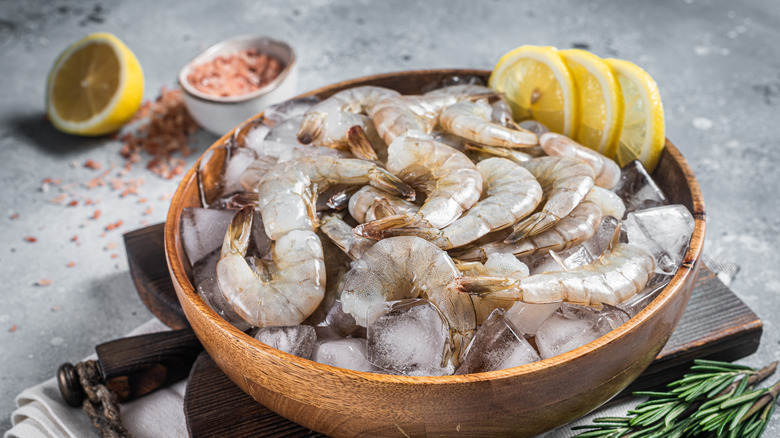Can Lemon Juice Actually Cook Shrimp?
When it comes to raw seafood, practicing proper handling and cooking techniques is essential to avoiding foodborne illnesses. Shrimp, for instance, can harbor bacteria, parasites, and viruses that can only be eliminated by cooking with heat. While cultural dishes like ceviche involve preparing raw seafood with lemon juice rather than heat, the lemon doesn't technically cook the shrimp.
In a dish like ceviche that has Peruvian origins dating back 3,000 years, shrimp and other seafood are only marinated in an acidic juice before being served. There's a science behind how ceviche "cooks," though. Essentially, the lemon juice cures the crustacean flesh. It triggers a chemical process called denaturation that modifies the structure of the proteins in shrimp on a molecular level. The proteins consist of long chains of folded and twisted atoms, but they lose this native form under extreme conditions, such as the application of acidic juices. As a result, the proteins bond together, making the flesh appear opaque and feel firmer. This same rearrangement of proteins occurs when shrimp is cooked with heat, but the acidic marinade isn't as harsh on the flesh, leaving you with more moist and tender shrimp.
Tips for safely preparing shrimp with lemon juice
Using lemon juice alone may not be as effective at killing illness-provoking organisms in shrimp. However, it's possible to prepare the crustaceans in this traditional way for safe consumption. Much like eating raw fish in sushi, for instance, the first step is to choose the best fresh fish for ceviche. You want the freshest shrimp you can find from a source that you can trust. If possible, only purchase seafood with a "sushi-grade" label, which generally means that it's super-high quality and can be consumed uncooked without concern for illnesses. You're more likely to find this at a fish or specialty market than your local grocer.
Next, you shouldn't skip the marinade step when making ceviche or a similar dish that doesn't involve cooking seafood with heat. The length of time most recommended for shrimp is 30 minutes because you want to make sure that the lemon juice has enough time to denature the proteins. Also, make sure that you use plenty of juice to fully cover the crustaceans, and let them marinate in the refrigerator rather than on your counter to maintain a safe temperature and avoid the possibility of bacterial growth. Just keep in mind that squeezing the lemons too hard is the citrus mistake to avoid bitter ceviche because it releases the bitter chemical limonin from the peel into the juice.

